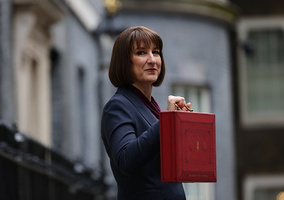Ahead of her budget yesterday, charities and community organisations had one simple ask for chancellor Rachel Reeves: Do not place further pressure on an already stretched voluntary sector.
Reeves’ last autumn budget left a bitter taste in the mouth. Her decision to increase the employers’ national insurance contribution (NIC) rate from 13.8% to 15% and reduce the secondary threshold from £9,100 to £5,000 has placed significant pressure on charity employers.
With a sector facing “a perfect storm” of reduced funding, increasing costs and skyrocketing demand, many waited for Reeves’ budget with bated breath.
Reeves said her budget was built on the choices the government has made since July 2024, including cutting NHS waiting lists, the cost of living and debt and borrowing, adding that “these are my choices, the right choices for a fairer, stronger and more secure Britain”.
She promised that her budget would deliver immediate relief for families, no return to austerity, lower inflation and financial debt, and with her “fiscal headroom” more than doubling to £21.7bn.
Meanwhile, the Office for Budget Responsibility (OBR) upgraded its assessment of the UK’s economic growth in 2025 to 1.5% from 1% in the spring, but downgraded its future productivity forecast, meaning £16bn less would be received in tax receipts by 2030.
Concern over donations
One of the first measures Reeves announced was reducing the individual savings accounts (ISA) allowance for under-65s from April 2027 to £12,000 within the overall annual limit of £20,000.
There is concern that reducing the ISA allowance might discourage long-term saving and push some people to shift more into stocks/shares ISAs, reduce the use of ISAs or seek other tax-efficient routes.
Raya Wexler, co-founder of CharityJob, said: “As a result, some donors may have less liquid tax-free cash sitting in ISAs or cash-savings vehicles, thus potentially reducing the size or frequency of charity donations in the short term.
“If more of individuals’ savings go into longer-term investments rather than cash, they may feel less able to give or prefer to lock in capital rather than donate. These ISA rule changes may tighten personal savings and dampen donation flows, leading charities to slow recruitment and focus on essential roles.”
Reeves’ removal of Universal Credit’s two-child benefit cap from April 2026, which is expected to lift 450,000 children out of poverty, was welcomed by the sector.
Charities including the Institute for Public Policy Research and King’s Fund said the long-overdue move will be a turning point for struggling families in the UK and a first step towards ending child poverty.
Income tax freezes
Reeves announced that all income tax and equivalent NI thresholds will be frozen from 2028 to 2031, a decision she conceded “will affect working people”.
Some in the voluntary sector warned that freezing income tax thresholds could result in fewer charitable donations, as fiscal drag reduces disposable income.
Reeves said that taxes aimed at wealthier people, including taxes on property, dividend and savings income – which do not currently face an equivalent of NI – will rise by 2p.
From 2028, there will be a new high-value council tax surcharge on English homes worth over £2m – an annual £2,500 charge for properties, rising to £7,500 for properties worth over £5m.
This new surcharge is expected to raise over £400m by 2031 and will be charged on less than the top 1% of properties.
Reeves announced a £2,000 cap from 2029 on salary sacrifice into a pension, with contributions above that taxed in the same way as other employee pension contributions, which she said would primarily affect the highest earners.
Prior to the budget, Reeves accepted the recommendations of the Low Pay Commission in full, increasing the national minimum wage for 18-20 year olds by 8.5% to £10.85 per hour and the national living wage by 4.1% to £12.71 for eligible workers aged 21 and over from April 2026.
While many in the sector welcomed the rises in principle, some said that without extra financial support, it could force voluntary organisations to make difficult decisions.
NCVO’s chief influencing officer Leigh Brimicombe commented: “Many charities are already under severe financial pressure to meet the rising cost of delivering services. With employer NI also increasing in April, higher wage bills will add further strain at a time when funding is falling. Many organisations will have to review the services they offer as a result, which puts staff and the communities they support at risk.”
Response to energy plans
Reeves scrapped the Conservatives’ Energy Company Obligation scheme, “which was presented as a plan to tackle fuel poverty” and “costs households £1.7bn a year on their bills”.
In its place, she promised a £150 cut from the average household’s energy bill from April 2026 and a one-year freeze on regulated train fares and prescription charges.
However, Nick Temple, CEO of Social Investment Business, said the budget did nothing for charities’ energy bills and could “push the sector deeper into relative fuel poverty”.
“The sector already faces unmanageable bills, with some organisations forced to spend half their entire budget on utilities,” he said.
“[The] announcements will bring no relief to those organisations struggling to keep the lights on as they deliver vital public services, who will instead be faced with higher bills in the coming months.”
Nevertheless, Temple welcomed Reeves’ commitment to provide an extra £1.5bn capital investment to tackle fuel poverty through the Warm Home Plan, in addition to the £13.2bn of funding allocated at the June spending review.
Charity-related measures
Earlier this year, the Treasury launched a consultation on plans to introduce a new VAT relief on goods that businesses donate to charities.
Proponents of the consultation and this charity tax relief will be pleased that this will be introduced from 1 April 2026.
In an accompanying budget document, the government said it is “committed to ensuring that the tax system enables and encourages generosity from businesses and individuals”, and the relief will help charities deliver essential services to the people who rely on them.
The relief will apply to goods valued under £100 – with a second-tier limit of £200 for items such as computers usually valued over the £100 limit – and to donations made to registered charities.
The budget document confirms that legislation on tainted donations, approved investments and non-charitable expenditure will be introduced as part of the finance bill 2025-26 and take effect from 6 April 2026.
A separate document reads: “The government will change the rules governing what’s regarded as a tainted donation. HMRC will no longer look solely at the motivation of the donor to determine whether a donation is tainted. Instead, HMRC will also look at the outcome of the transaction. In addition, the government will seek to lower the bar for establishing whether a transaction is tainted by replacing the test of ‘financial advantage’ with ‘financial assistance’.”
The budget document contains a section on inheritance tax avoidance, saying that the government will legislate to prevent it through certain loopholes. This includes “ensuring UK agricultural property held via non-UK entities is treated as UK-situated addressing changes in status of trust assets before and exit charge, and restricting charity exemptions to direct gifts to UK charities and clubs”.
“This will be legislated for in the finance bill 2025-26 and will take effect for trust exit charges from 26 November 2025, gifts to charities in lifetime from 26 November 2025 or on a death from 6 April 2026, and for UK agricultural property from 6 April 2026.”
Another change that might affect some charities is that from April 2027, the government will exempt search and rescue vehicles from the vehicle excise duty, working with stakeholders to design and implement the exemption.
The government also confirmed a 32% increase in the immigration skills charge – a levy on UK employers who sponsor non-UK nationals under the skilled worker scheme – to take into account inflation since it was introduced in 2017.
From mid-December 2025, the charge for small and charitable sponsors will rise from £364 to £480, and from £1,000 to £1,320 for medium and large sponsors. The government estimated that the increase will generate £45m in 2025-26 and £155m in 2030-31.
Announcing her budget, Reeves said she had “met my fiscal rules and built our economic resilience for the future” while keeping Labour’s manifesto commitments.
While it undoubtably avoided any significant shocks like last year’s NICs rise, for some, Reeves’ budget failed to provide immediate relief measures to voluntary organisations and, in some cases, will leave them worse off.
Editor’s note: A version of this article will appear in the December 2025 issue of Charity Finance.











